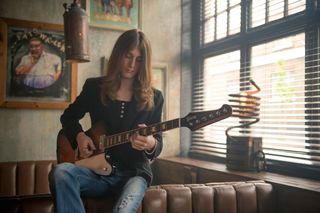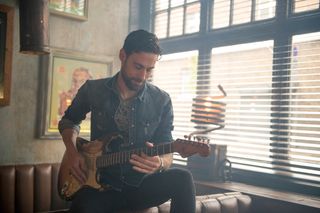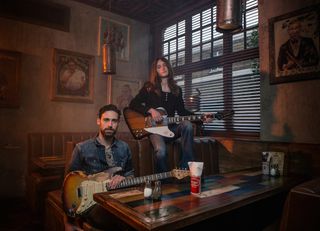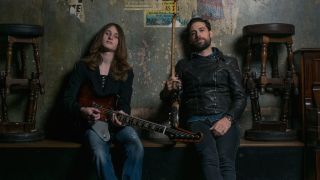They make a cool pair, comparing old-school guitars in Camden’s Blues Kitchen. Beaming, pint-sized South African Dan Patlansky deals in funked-up blues rock, while the taller, softly spoken Aaron Keylock rivals heroes like Johnny Winter – at the tender age of 17. “The blues is a genre that lends itself to individuals putting their own feel into it,” says Patlansky. Keylock agrees: “It’s an emotional kind of music.”
What is it about the blues in 2015 that excites you?
Aaron Keylock: I think a lot of people like it, I just don’t think a lot of people know they like it. It’s the label ‘blues’ that puts a lot of people off – it seems old.
**Dan Patlansky: **He’s dead right. But modern blues is not your daddy’s blues; it’s like renegade blues, which is what excites me. And I love its simplicity; you can do so much with it.
**Including taking it to the mainstream? **
Patlansky: Guys like Jack White made blues mainstream in a sense. They made it cool again.
Keylock: You have to put your own spin on it, do what Jack White did and put your own feel into it while taking stuff from the old guys.
Neither of you are exactly purists.
Patlansky: It’s like looking at a meal. I always think of the blues as the main ingredient, the ‘core blues’, and then you can add all your other loves – so for me, old-school rock’n’roll, funk, soul… All that stuff you can mix into a big gumbo, which hopefully tastes pretty good!
Keylock: Yeah, I grew up a lot more on rock’n’roll and a lot of the stuff my dad was listening to. So the Rolling Stones, Lynyrd Skynyrd… And when I started guitar lessons, I got into blues.
You mentioned Jack White as a contemporary blues artist. He drew from Led Zeppelin, who drew from Robert Johnson…
Patlansky: I think those old guys like Son House, at the roots of it all, will always be relevant. Because the biggest influence I hear in Jack White, if we’re talking about him, is Son House. He’s got that raw, almost offensive blues sound. For me, Son House was so ahead of his time, because everyone else was playing this sweet, melodic blues and he made this jarring, in-your-face type of sound. So there’s always so much to draw from the old guys.
Keylock: Blues is like an addiction, so you’ll always trace it back. You won’t just stick with one size. And being a three-piece allows you to free up a bit more, which creates more of a loose, raw, early rock’n’roll sound. You can turn it up louder, hit it harder, have more fun.
Historically, the blues has emerged through struggle. Is it harder to write with the same soul in the 21st century?
Keylock: I’ve got that a lot, especially when I was younger: “How does a fourteen-year-old sing about, y’know, losing his wife?” But I’ve always seen it as emotional music – it doesn’t have to be sad. It’s about feeling something.
Patlansky: I agree completely. There’s all different kinds of blues: happy blues, party blues, downer blues… I mean, I love the cliched blues – all that ‘whiskey and woman’ stuff, which was all they really sang about back in the day, but for some tunes it’s right to go for a more modern approach. We’re not picking cotton, but I suppose our problems are the kind of things that modern blues can be about.

Aaron, you first started writing songs aged eleven. What kind of problems were you externalising then?
Keylock: Oh god, they were terrible…
Patlansky: I remember my first song. I thought I’d stumbled upon this groundbreaking thing and all I did was write a twelve-bar blues piece! And in those days, really all I cared about was the guitar playing. I didn’t give a crap about anything else. So my lyrics were kinda shallow: ‘Lost mah baby, oh how shit life is…’
**You finished school last year, Aaron. Did your blues affection make you stick out? **
Keylock: I think they kinda liked it actually – they used to come to my shows. And still do, which is cool.
Patlansky: When I grew up I was into blues and classic rock, and everyone at school was into Eminem. I didn’t have much of a social life as a teenager because I found it more satisfying staying home on a Saturday night with a CD than going out and getting drunk with my mates at a club.
Keylock: Yeah, even when I was younger, kids just used to go down the park. They used to come and knock at my door and I’d rather be home working out a BB King lick or something.
Has the rise of YouTube and the like had a damaging effect on jamming culture? Tying people to screens when they used to have to meet up?
Keylock: There’s a lot of people you’ll see filming themselves playing a song and sticking it on YouTube. They might get five million views but it’s not the same as playing onstage in front of a live audience. I mean, yeah, I might practise in my room, but it’s the excitement of a gig that does it for me – the crowd, the sound, reactions to the music, the adrenalin… But I’ve got friends who, if I ask them, “Do you wanna go and watch a show?” will say, “No, you can watch it for free on the internet,” which is a bit sad.
Patlansky: It is sad, and it’d be scary if society got to a point where you do a live gig in front a GoPro camera, say – even if you were reaching millions of people. So much energy on stage comes from the audience.

Tell us about some of your less fun gig memories.
Patlansky: Well, there was that gig in a small, backward town in South Africa, still stuck in Apartheid. And we were booked to play the Spring dance. All we had to offer was a very loud, in-your-face, three-piece set. We played – six hundred people there… Two minutes into the first song, there were six hundred people queueing to get out, and they were doing the throat-slitting movement: “What is this devil music you’re playing?” It was the longest four hours of my life. I was looking for an escape in case someone pulled out a shotgun.
Keylock: I did a jam in here when the London riots happened. All of a sudden, halfway through the fifth number, they shut the blinds down, cut the PA off and we had to sneak out the back door and drive home. But when you’re fourteen, you just see the fun side of it.
Patlansky: We’ve got really poisonous snakes back home, and we’ve had the odd situation where the backstage area is more like a shed. And the promoter will say, “Yep just make sure before you sit or move something that you have a gander for snakes or spiders…”
You both supported big names last year – Dan opened for Bruce Springsteen and Aaron supported Blackberry Smoke. They aren’t easy audiences to crack.
Patlansky: It’s all very well when you’re playing for seventy thousand people, but nobody’s there to see me. They’re all thinking: “Who’s this guy? Where’s Bruce?”
Keylock: The bigger the act, the more the crowd seem to hate supports. They’ll be thinking, “I didn’t pay all this money to see Aaron Keylock, I paid to see Blackberry Smoke.”
**Patlansky: **You have to try to win them over.
Keylock: Yeah, and they stand there going, “Impress me!”
Who do you see as leading the charge in modern blues?
**Patlansky: **Joe Bonamassa, of course. And I love Philip Sayce – he’s an incredible Strat player. And guys like Kenny Wayne Shepherd fly the flag, and Jack White.
Keylock: The main guy I’ve been into lately is Gary Clark Jr. He’s got the laid-back thing, but it’s emotional and hard-hitting when he wants it to be.
Patlansky: And he’s bringing something fresh – creating that blues renegade culture.
So where will the blues go from here?
Patlansky: Because of the nature of the blues and its simplicity, in one sense it’s harder to get a really original sound, but it’s also easier to steer it in different directions. As a genre it’ll be here forever, even though it might fluctuate in popularity as the Jack Whites and Gary Clark Jrs come and go.
Keylock: You hear blues in rock guys, some metal guys… It’s so emotional and really all music’s been influenced by it.
**If you could each play with any blues artist alive today, who would it be? **
Patlansky: BB King, ’cos he’s one of the last real legends still going. I think I’d cry. [Sadly, BB King passed away shortly after this interview, aged 89.]
Keylock: Buddy Guy. I think he’s an absolutely amazing performer, as well as a musician.



